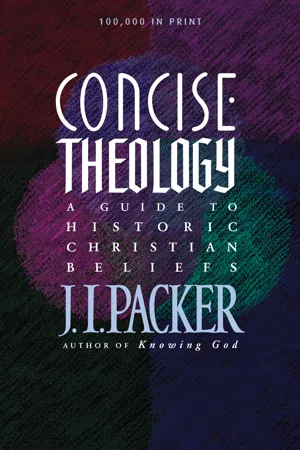
- English
- ePUB (mobile friendly)
- Available on iOS & Android
eBook - ePub
About this book
Theology is at its healthiest when it is consciously under the eye of the God of whom it speaks, and when it is singing to his glory. – J.I. Packer from the Preface
Respected theologian and author of Knowing God, J.I. Packer, explains the essentials of biblical belief and Christian doctrine in a style that grounds and inspires. With each chapter being the perfect length for busy readers, this summary of Christian teaching covers 94 beliefs from a Reformed perspective. Each one highlights a unique facet of God and his plan for us.
Packer offers clear, precise descriptions that are accessible without sacrificing depth, including Scripture verses on each topic for further study. Thoughtfully arranged and refreshingly readable, this helpful systematic theology resource explores:
Respected theologian and author of Knowing God, J.I. Packer, explains the essentials of biblical belief and Christian doctrine in a style that grounds and inspires. With each chapter being the perfect length for busy readers, this summary of Christian teaching covers 94 beliefs from a Reformed perspective. Each one highlights a unique facet of God and his plan for us.
Packer offers clear, precise descriptions that are accessible without sacrificing depth, including Scripture verses on each topic for further study. Thoughtfully arranged and refreshingly readable, this helpful systematic theology resource explores:
- the mystery of the Trinity
- how predestination fits into God's redemptive plan
- the process of justification and sanctification
- the purpose of spiritual gifts within the church
- the kingdom of God
- hope and love, holiness and wisdom
Frequently asked questions
Yes, you can cancel anytime from the Subscription tab in your account settings on the Perlego website. Your subscription will stay active until the end of your current billing period. Learn how to cancel your subscription.
No, books cannot be downloaded as external files, such as PDFs, for use outside of Perlego. However, you can download books within the Perlego app for offline reading on mobile or tablet. Learn more here.
Perlego offers two plans: Essential and Complete
- Essential is ideal for learners and professionals who enjoy exploring a wide range of subjects. Access the Essential Library with 800,000+ trusted titles and best-sellers across business, personal growth, and the humanities. Includes unlimited reading time and Standard Read Aloud voice.
- Complete: Perfect for advanced learners and researchers needing full, unrestricted access. Unlock 1.4M+ books across hundreds of subjects, including academic and specialized titles. The Complete Plan also includes advanced features like Premium Read Aloud and Research Assistant.
We are an online textbook subscription service, where you can get access to an entire online library for less than the price of a single book per month. With over 1 million books across 1000+ topics, we’ve got you covered! Learn more here.
Look out for the read-aloud symbol on your next book to see if you can listen to it. The read-aloud tool reads text aloud for you, highlighting the text as it is being read. You can pause it, speed it up and slow it down. Learn more here.
Yes! You can use the Perlego app on both iOS or Android devices to read anytime, anywhere — even offline. Perfect for commutes or when you’re on the go.
Please note we cannot support devices running on iOS 13 and Android 7 or earlier. Learn more about using the app.
Please note we cannot support devices running on iOS 13 and Android 7 or earlier. Learn more about using the app.
Yes, you can access Concise Theology by J. I. Packer in PDF and/or ePUB format, as well as other popular books in Theology & Religion & Christian Denominations. We have over one million books available in our catalogue for you to explore.
Information



REVELATION
SCRIPTURE IS THE WORD OF GOD
The tablets were the work of God; the writing was the writing of God, engraved on the tablets.
EXODUS 32:16

From one standpoint, the Scriptures (Scriptures means “writings”) are the faithful testimony of the godly to the God whom they loved and served; from another standpoint, through a unique exercise of divine overruling in their composition, they are God’s own testimony and teaching in human form. The church calls these writings the Word of God because their authorship and contents are both divine.
Decisive assurance that Scripture is from God and consists entirely of his wisdom and truth comes from Jesus Christ and his apostles, who taught in his name. Jesus, God incarnate, viewed his Bible (our Old Testament) as his heavenly Father’s written instruction, which he no less than others must obey (Matt. 4:4, 7, 10; 5:19-20; 19:4-6; 26:31, 52-54; Luke 4:16-21; 16:17; 18:31-33; 22:37; 24:25-27, 45-47; John 10:35), and which he had come to fulfill (Matt. 5:17-18; 26:24; John 5:46). Paul described the Old Testament as entirely “God-breathed”—that is, a product of God’s Spirit (“breath”) just as the cosmos is (Ps. 33:6; Gen. 1:2)—and written to teach Christianity (2 Tim. 3:15-17; Rom. 15:4; 1 Cor. 10:11). Peter affirms the divine origin of biblical teaching in 2 Peter 1:21 and 1 Peter 1:10-12, and so also by his manner of quoting does the writer to the Hebrews (Heb. 1:5-13; 3:7; 4:3; 10:5-7, 15-17; cf. Acts 4:25; 28:25-27).
Since the apostles’ teaching about Christ is itself revealed truth in God-taught words (1 Cor. 2:12-13), the church rightly regards authentic apostolic writings as completing the Scriptures. Already Peter refers to Paul’s letters as Scripture (2 Pet. 3:15-16), and Paul is apparently calling Luke’s gospel Scripture in 1 Timothy 5:18, where he quotes the words of Luke 10:7.
The idea of written directives from God himself as a basis for godly living goes back to God’s act of inscribing the Decalogue on stone tablets and then prompting Moses to write his laws and the history of his dealings with his people (Exod. 32:15-16; 34:1, 27-28; Num. 33:2; Deut. 31:9). Digesting and living by this material was always central to true devotion in Israel for both leaders and ordinary people (Josh. 1:7-8; 2 Kings 17:13; 22:8-13; 1 Chron. 22:12-13; Neh. 8; Ps. 119). The principle that all must be governed by the Scriptures, that is, by the Old and New Testaments taken together, is equally basic to Christianity.
What Scripture says, God says; for, in a manner comparable only to the deeper mystery of the Incarnation, the Bible is both fully human and fully divine. So all its manifold contents—histories, prophecies, poems, songs, wisdom writings, sermons, statistics, letters, and whatever else—should be received as from God, and all that Bible writers teach should be revered as God’s authoritative instruction. Christians should be grateful to God for the gift of his written Word, and conscientious in basing their faith and life entirely and exclusively upon it. Otherwise, we cannot ever honor or please him as he calls us to do.
INTERPRETATION
CHRISTIANS CAN UNDERSTAND THE WORD OF GOD
Give me understanding, and I will keep your law and obey it with all my heart.
PSALM 119:34

Every book of Scripture is a human composition, and though it should always be revered as the Word of God, interpretation of it must start from its human character. Allegorizing, therefore, which disregards the human writer’s expressed meaning is never appropriate.
Each book was written not in code but in a way that could be understood by the readership to which it was addressed. This is true even of the books that primarily use symbolism: Daniel, Zechariah, and Revelation. The main thrust is always clear, even if details are clouded. So when we understand the words used, the historical background, and the cultural conventions of the writer and his readers, we are well on the way to grasping the thoughts that are being conveyed. Spiritual understanding—that is, the discernment of the reality of God, his ways with humankind, his present will, and one’s own relationship to him now and for the future—will not however reach us from the text until the veil is removed from our hearts and we are able to share the writer’s own passion to know and please and honor God (2 Cor. 3:16; 1 Cor. 2:14). Prayer that God’s Spirit may generate this passion in us and show us God in the text is needed here. (See Ps. 119:18-19, 26-27, 33-34, 73, 125, 144, 169; Eph. 1:17-19; 3:16-19.)
Each book had its place in the progress of God’s revelation of grace, which began in Eden and reached its climax in Jesus Christ, Pentecost, and the apostolic New Testament. That place must be borne in mind when studying the text. The Psalms, for instance, model the godly heart in every age, but express its prayers and praises in terms of the typical realities (earthly kings, kingdoms, health, wealth, war, long life) that circumscribed the life of grace in the pre-Christian era.
Each book proceeded from the same divine mind, so the teaching of the Bible’s sixty-six books will be complementary and self-consistent. If we cannot yet see this, the fault is in us, not in Scripture. It is certain that Scripture nowhere contradicts Scripture; rather, one passage explains another. This sound principle of interpreting Scripture by Scripture is sometimes called the analogy of Scripture or the analogy of faith.
Each book exhibits unchanging truth about God, humanity, godliness, and ungodliness, applied to and illustrated by particular situations in which individuals and groups found themselves. The final stage in biblical interpretation is to reapply these truths to our own life-situations; this is the way to discern what God in Scripture is saying to us at this moment. Examples of such reapplication are Josiah’s realization of God’s wrath at Judah’s failure to observe his law (2 Kings 22:8-13), Jesus’ reasoning from Genesis 2:24 (Matt. 19:4-6), and Paul’s use of Genesis 15:6 and Psalm 32:1-2 to show the reality of present righteousness by faith (Rom. 4:1-8).
No meaning may be read into or imposed on Scripture that cannot with certainty be read out of Scripture—shown, that is, to be unambiguously expressed by one or more of the human writers.
Careful and prayerful observance of these rules is a mark of every Christian who “correctly handles the word of truth” (2 Tim. 2:15).
GENERAL REVELATION
GOD’S REALITY IS KNOWN TO ALL
The heavens declare the glory of God; the skies proclaim the work of his hands.
PSALM 19:1

General revelation is so called because everyone receives it, just by virtue of being alive in God’s world. This has been so from the start of human history. God actively discloses these aspects of himself to all human beings, so that in every case failure to thank and serve the Creator in righteousness is sin against knowledge, and denials of having received this knowledge should not be taken seriously. God’s universal revelation of his power, praiseworthiness, and moral claim is the basis of Paul’s indictment of the whole human race as sinful and guilty before God for failing to serve him as we should (Rom. 1:18–3:19).
God has now supplemented general revelation with the further revelation of himself as Savior of sinners through Jesus Christ. This revelation, given in history and embodied in Scripture, and opening the door of salvation to the lost, is usually called special or specific revelation. It includes explicit verbal statement of all that general revelation tells us about God, and teaches us to recognize that revelation in the natural order, in the events of history, and in the makeup of human beings, so that we learn to see the entire world as, in Calvin’s phrase, a theatre of the glory of God.
GUILT
THE EFFECT OF GENERAL REVELATION
. . . what may be known about God is plain to them, because God has made it plain to them.
ROMANS 1:19

Scripture explains this state of affairs by telling us that sinful egoism and aversion to our Creator’s claims drive humankind into idolatry, which means transferring worship and homage to some power or object other than God the Creator (Isa. 44:9-20; Rom. 1:21-23; Col. 3:5). In this way, apostate humans “suppress the truth” and have “exchanged the glory of the immortal God for images made to look like mortal man and birds and animals and reptiles” (Rom. 1:18, 23). They smother and quench, as far as they can, the awareness that general revelation gives them of the transcendent Creator-Judge, and attach their ineradicable sense of deity to unworthy objects. This in turn leads to drastic moral decline, with consequent misery, as a first manifestation of God’s wrath against human apostasy (Rom. 1:18, 24-32).
Nowadays in the West people idolize and, in effect, worship secular objects such as the firm, the family, football, and pleasant feelings of various kinds. But moral decline still results, just as it did when pagans worshipped literal idols in Bible times.
Human beings cannot entirely suppress their sense of God and his present and future judgment; God himself will not let them do that. Some sense of right and wrong, as well as of being accountable to a holy divine Judge, always remains. In our fallen world all whose minds are not in some way impaired have a conscience that at some points directs them and from time to time condemns them, telling them that they ought to suffer for wrongs they have done (Rom. 2:14ff.); and when conscience speaks in these terms it is in truth the voice of God.
Fallen humankind is in one sense ignorant of God, since what people like to believe, and do in fact believe, about the objects of their worship falsifies and distorts the revelation of God they cannot escape. In another sense, however, all human beings remain aware of God, guilti...
Table of contents
- Cover Image
- Title Page
- Copyright
- Contents
- Preface
- Part One: God Revealed as Creator
- Part Two: God Revealed as Redeemer
- Part Three: God Revealed as Lord of Grace
- Part Four: God Revealed as Lord of Destiny